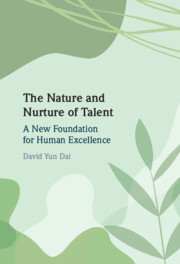Book contents
- The Nature and Nurture of Talent
- The Nature and Nurture of Talent
- Copyright page
- Dedication
- Contents
- Illustrations
- Foreword
- Acknowledgments
- Introduction Rationale, Goals, and Overview of the Book
- Chapter 1 The Evolving Complexity Theory of Talent Development
- Chapter 2 The Question of What Develops
- Chapter 3 The Question of How Talent Develops
- Chapter 4 The Question of When Critical Events Should Take Place
- Chapter 5 The Question of Where
- Chapter 6 How ECT Explains Various Talent Achievements
- Chapter 7 ECT in a Broader Landscape of Theoretic Models
- Chapter 8 Implications of ECT for Talent Identification and Assessment of Developmental Progressions
- Chapter 9 Implications of ECT for Promoting Human Excellence
- Chapter 10 Implications of ECT for Research Methodology
- Epilogue Is AI a Threat to Human Excellence?
- Postscript
- Glossary
- References
- Index
Chapter 5 - The Question of Where
Cultural Evolution and How It Transforms Talent and Talent Development
Published online by Cambridge University Press: aN Invalid Date NaN
- The Nature and Nurture of Talent
- The Nature and Nurture of Talent
- Copyright page
- Dedication
- Contents
- Illustrations
- Foreword
- Acknowledgments
- Introduction Rationale, Goals, and Overview of the Book
- Chapter 1 The Evolving Complexity Theory of Talent Development
- Chapter 2 The Question of What Develops
- Chapter 3 The Question of How Talent Develops
- Chapter 4 The Question of When Critical Events Should Take Place
- Chapter 5 The Question of Where
- Chapter 6 How ECT Explains Various Talent Achievements
- Chapter 7 ECT in a Broader Landscape of Theoretic Models
- Chapter 8 Implications of ECT for Talent Identification and Assessment of Developmental Progressions
- Chapter 9 Implications of ECT for Promoting Human Excellence
- Chapter 10 Implications of ECT for Research Methodology
- Epilogue Is AI a Threat to Human Excellence?
- Postscript
- Glossary
- References
- Index
Summary
Chapter 5 looks at talent development and human excellence in a broader social-historical conditions and changes. The flourishing of particular forms of excellence in a given historical period or culture is always distinct, due to both cultural values and priorities as well as societal changes in social structure, leisure, and conditions of education. If human excellence reflects high-level self-organized individuality, then sociocultural contexts matter; ECT supports the notion of personal agency in changing the world and changing history, not by traits and genes, notwithstanding their meaningful role, but by cultural evolution that leverages characteristic and maximal adaptation with its niche construction and infrastructure-building to achieve the prosperity and vitality of its members. However, sociocultural conditions (including available technology) also significantly constrain individual strivings as well as how far individuals can go. The Needham Puzzle on the birth of modern science (why it occurred in the West, not China) is discussed, and a comparison is made of Da Vinci and Wang Yangming to demonstrate that any creative act is a sociocultural act, which can change history, yet is constrained by one’s times.
Keywords
- Type
- Chapter
- Information
- The Nature and Nurture of TalentA New Foundation for Human Excellence, pp. 104 - 129Publisher: Cambridge University PressPrint publication year: 2024



